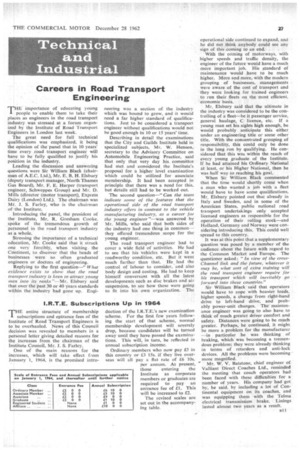Careers in Road Transport Engineering
Page 29

If you've noticed an error in this article please click here to report it so we can fix it.
THE importance of educating young people to enable them to take their places as engineers in the road transport industry was stressed at a forum organized by the Institute of Road Transport Engineers in London last week.
The great need for full technical qualifications was emphasized, it being the opinion of the panel that in 10 years' time every road transport engineer will have to be fully qualified to justify his position in the industry.
Leading the discussion and answering questions were Sir William Black (chairman of A.E.C. Ltd.), Mr. E. B. H. Elsbury (deputy transport manager, North Thames Gas Board), Mr. F. E. Harper (transport engineer, Schweppes Group) and Mr. D. Mills (director (motor transport), Express Dairy (London) Ltd.). The chairman was Mr. J. S. Farley, who is the chairman of the Institute.
Introducing the panel, the president of the Institute, Mr. R. Gresham Cooke, spoke of the tremendous growth of personnel in the road transport industry as a whole.
Stressing the importance of a technical education, Mr. Cooke said that it struck one very forcibly, when visiting the Continent, to discover that the heads of businesses were so often graduated engineers or doctors of engineering.
Replying to the first question—" What evidence exists to show that the road transport industry is keen to attract young men into its ranks"—Mr. Elsbury said that over the Past 30 or 40 years standards within the industry had gone up. Engi neering was a section of the industry which was bound to grow, and it would need a far higher standard of qualifications. Just to be considered a transport engineer without qualifications would not be good enough in 10 or 15 years' time.
Describing in detail the examinations that the City and Guilds Institute held in specialized subjects, Mr. W. Henson. secretary to the Advisory Committee on Automobile. Engineering Practice, said that only that very day his committee had met and considered the Institute's proposal for a higher level examination Which could be utilized for associate membership. It had been accepted in principle that there was a need for this, but details still had to be worked out.
The second question—" Can the team indicate some of the features that the operational side of the road transport industry offers in contrast to the vehicle manufacturing industry, as a career for the young engineer"—was answered by Mr. Mills, who said that both sides of the industry had one thing in common— they offered tremendous scope for the young engineer.
The road transport engineer had to cover a wide field of activities. He had to see that his vehicles were kept in a roadworthy condition. etc. But it went much further than that. He had the control of labour to consider, and also body design and costing. He had to keep himself conversant with all the latest developments such as disc brakes and all suspension, to see how these were going to fit into his own organization. The




















































































